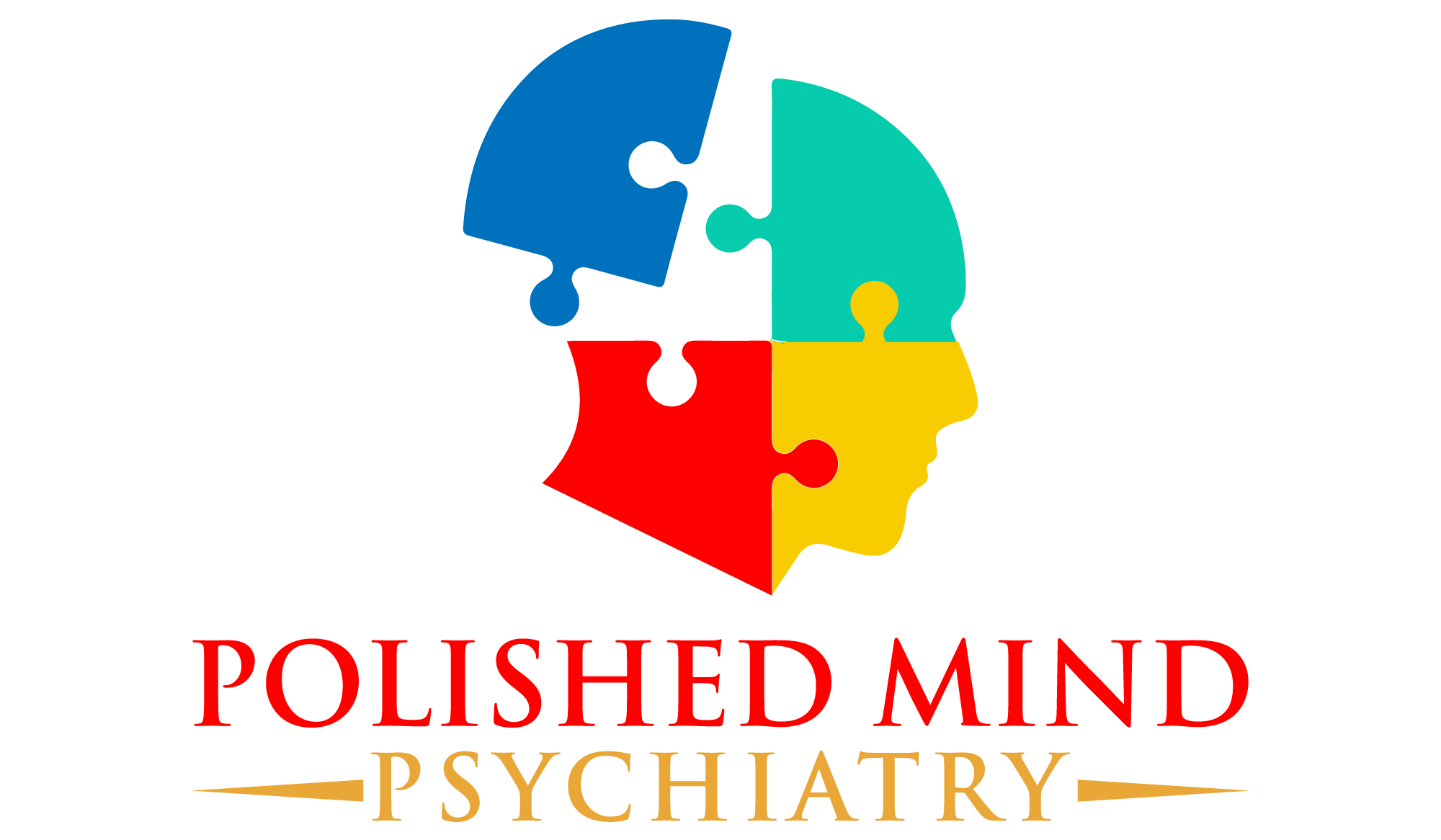Living with bipolar disorder presents unique challenges, but with the right approach, managing its effects is possible. This condition, characterized by shifts in mood, energy, and activity levels, requires a structured plan for well-being. Understanding how to deal with bipolar disorder involves recognizing its signs, working with healthcare professionals, and making lifestyle adjustments. Polished Mind Psychiatry is here to help individuals in Texas, Washington, California, Iowa, and New York find clarity and achieve optimal function through personalized care and telehealth options. Let’s explore effective strategies to help you manage bipolar disorder and improve your quality of life.
Key Takeaways
- Understanding the signs and symptoms of bipolar disorder is the first step toward effective management.
- A personalized treatment plan, often including medication and lifestyle changes, is key to dealing with bipolar disorder.
- Building a strong support system, including family, friends, and professional guidance from a psychiatrist, is vital for long-term well-being.
Understanding Bipolar Disorder and Its Management

Bipolar disorder is a complex mental health condition characterized by significant shifts in mood, energy, and activity levels. These shifts can range from periods of elevated mood, known as mania or hypomania, to episodes of depression. For individuals in Texas, Washington, California, Iowa, and New York, understanding these patterns is the first step toward effective management. Polished Mind Psychiatry recognizes the challenges associated with bipolar disorder and is dedicated to providing clear, accessible information to help individuals and their families.
Recognizing the Signs and Symptoms of Bipolar Disorder
Identifying the signs of bipolar disorder is key to seeking timely help. Symptoms can vary greatly from person to person and can include:
- Manic or Hypomanic Episodes: These periods often involve increased energy, reduced need for sleep, racing thoughts, impulsivity, and sometimes grandiose ideas. Individuals might feel unusually happy, irritable, or
Effective Strategies on How to Deal with Bipolar

Living with bipolar disorder means finding ways to manage mood swings and keep life on a more even keel. It’s not about eliminating ups and downs entirely, but about developing tools and routines that help you navigate them more effectively. For individuals in Texas, Washington, California, Iowa, and New York, finding the right approach is key. Polished Mind Psychiatry understands that a one-size-fits-all method doesn’t work for everyone. That’s why developing a personalized plan is so important.
Developing a Personalized Treatment Plan
Creating a treatment plan tailored to your specific needs is the first big step. This isn’t something you have to figure out alone. A mental health professional can help you build a plan that considers your unique symptoms, history, and life circumstances. This plan often includes a combination of strategies, and it’s something that can evolve as you progress.
- Identify Triggers: Understanding what might set off mood shifts is a big part of managing bipolar disorder. This could be stress, lack of sleep, or even certain social situations.
- Set Realistic Goals: Focus on achievable steps for daily life, like maintaining a consistent sleep schedule or engaging in a brief period of physical activity.
- Incorporate Coping Mechanisms: Learn and practice techniques that help you manage difficult emotions or overwhelming thoughts.
A well-structured plan provides a roadmap, making the journey of managing bipolar disorder feel less daunting and more manageable on a day-to-day basis.
For those looking for professional help in creating such a plan, consider reaching out to Polished Mind Psychiatry. They can help you build a strategy that works for you.
The Role of Medication Management in Bipolar Disorder
Medication is often a cornerstone of bipolar disorder treatment. It can help stabilize mood swings and reduce the severity and frequency of manic and depressive episodes. It’s important to remember that medication isn’t a cure, but a tool to help manage the condition. Working closely with a psychiatrist is vital for finding the right medication and dosage for your needs. This often involves regular check-ins to monitor effectiveness and adjust as necessary. Managing bipolar disorder without medication might be an option for some, but it typically requires a very structured approach and close professional supervision.
Integrating Lifestyle Changes for Improved Well-being
Beyond professional treatment, making certain lifestyle adjustments can significantly support your mental health. These changes work in tandem with medication and therapy to create a more stable foundation.
- Consistent Sleep Schedule: Aim for 7-9 hours of quality sleep each night. Going to bed and waking up around the same time, even on weekends, can help regulate your body’s natural rhythms.
- Regular Physical Activity: Exercise is a known mood booster. Find activities you enjoy, whether it’s walking, swimming, or dancing, and try to incorporate them into your routine.
- Healthy Diet: While not a direct treatment, a balanced diet can impact overall energy levels and mood. Focus on whole foods and limit processed items.
- Stress Management Techniques: Practices like mindfulness, deep breathing exercises, or progressive muscle relaxation can be very helpful in managing stress stress-reduction techniques.
Adopting a holistic approach to managing bipolar disorder that includes these lifestyle factors can lead to better overall outcomes. If you’re in Texas, Washington, California, Iowa, or New York and want to discuss how these strategies can fit into your treatment, book an appointment with Polished Mind Psychiatry.
Building a Support System for Bipolar Disorder
The Value of Family and Social Support
Having a strong network of family and friends can make a significant difference when managing bipolar disorder. These relationships provide emotional backing, a listening ear, and practical help during challenging times. It’s important for individuals with bipolar disorder to communicate their needs openly with loved ones. Educating your support system about the condition can help them understand what you’re going through and how they can best assist. Remember, you don’t have to go through this alone. Building these connections is a key part of managing bipolar disorder.
Seeking Professional Guidance and Therapy
While personal relationships are vital, professional support is equally important. Therapists and psychiatrists offer specialized knowledge and treatment strategies tailored to bipolar disorder. They can help individuals develop coping mechanisms, manage symptoms, and navigate the complexities of the illness. At Polished Mind Psychiatry, we understand the importance of a comprehensive approach to mental health care. Our team is here to provide the support and guidance needed to help you achieve optimal well-being. If you’re looking for professional help, consider scheduling an appointment with us at Polished Mind Psychiatry.
Building a robust support system, both personal and professional, is not a sign of weakness, but a testament to one’s commitment to their own mental health and recovery. It creates a safety net that allows for greater resilience and a more stable path forward.
Here are some ways to build and utilize your support system:
- Educate Your Loved Ones: Share information about bipolar disorder, its symptoms, and how it affects you. This can be done through conversations, articles, or even involving them in educational sessions.
- Communicate Your Needs: Be clear about what kind of support you need, whether it’s someone to listen, help with daily tasks, or simply be present.
- Join Support Groups: Connecting with others who have similar experiences can be incredibly validating and informative. These groups offer a safe space to share and learn effective coping strategies for bipolar disorder.
- Maintain Regular Professional Contact: Consistent appointments with your psychiatrist and therapist are crucial for monitoring your condition and adjusting your treatment plan as needed. You can explore our services at Polished Mind Psychiatry.
- Set Healthy Boundaries: It’s okay to set boundaries with friends and family to protect your energy and well-being. This also applies to professional relationships, ensuring a healthy dynamic.
Creating a strong support network is key when dealing with bipolar disorder. Having people who understand and can help makes a big difference. It’s important to find the right kind of support for your journey. Ready to explore your options and build a better support system? Visit our website today to learn more and find the help you need.
Moving Forward with Bipolar Disorder
Living with bipolar disorder is a journey, not a quick fix. It takes work, but with the right tools and support, people can manage their symptoms and lead full lives. Remember, finding a treatment plan that fits you is key. This often means working with a doctor or therapist who understands bipolar disorder. They can help with medication, therapy, and figuring out lifestyle changes that make a difference. Don’t be afraid to ask for help or to try different approaches until you find what works best. Polished Mind Psychiatry is here to help you on this path. You can book an appointment at polishedmindpsychiatry.com/book-an-appointment to start your journey toward feeling better.
Frequently Asked Questions
What exactly is bipolar disorder?
Bipolar disorder is a mental health condition that causes extreme mood swings. People with bipolar disorder might experience periods of high energy and excitement (mania or hypomania) and periods of low mood and sadness (depression). These shifts can affect sleep, energy levels, behavior, and the ability to think clearly. It’s important to remember that while it’s a long-term condition, it can be managed effectively with the right support.
How can someone manage bipolar disorder?
Getting a proper diagnosis from a healthcare professional is the first step. Treatment often includes a mix of medication to help manage mood swings and therapy to learn coping skills. Making healthy lifestyle choices, like getting enough sleep, eating well, and exercising, can also make a big difference. Building a strong support system with friends, family, or support groups is also very helpful.
Does Polished Mind Psychiatry offer telehealth for bipolar disorder treatment?
Yes, Polished Mind Psychiatry offers telehealth services, which means you can receive care from the comfort of your home. They focus on personalized treatment plans, combining medication management with other strategies to help you live a better life. You can book an appointment on their website to learn more about how they can help.





